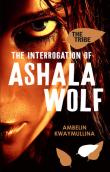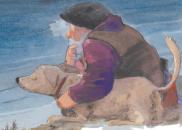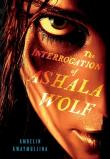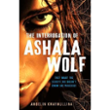AustLit
 4891556859894841507.jpeg
4891556859894841507.jpeg
Latest Issues
AbstractHistoryArchive Description
'The Reckoning destroyed civilisation and humanity has had to rise from the ashes. But there are now people with abilities - Flyers, Firestarters, Rumblers - and society is scared of them. The government calls them Illegals. Ashala Wolf protects a group of Illegals. They hide together in the Firstwood and she'll do anything to keep them safe. When Ashala is captured, she realises she has been betrayed by someone she trusted. Now she only has herself. But when Neville starts digging in her memories for information, she doubts she can protect her people forever...will the Tribe survive the interrogation of Ashala Wolf?'
Source: Publisher's blurb.
Teaching Resources
Notes
-
Included on the 2013 White Ravens list compiled by the International Youth Library in Munich, Germany.
Publication Details of Only Known VersionEarliest 2 Known Versions of
Other Formats
- Sound recording.
Works about this Work
-
“Then Something Started Growing in the Emptiness” : Revisiting the Lost Child in the Bush in Australian Colonial and Postcolonial Fiction
2023
single work
criticism
— Appears in: Storying Plants in Australian Children's and Young Adult Literature : Roots and Winged Seeds 2023; (p. 247=270)'In colonial Australian children’s literature, the desire to exert control over the land, its inhabitants, and the construction of a national identity has been a central concern, exemplified in the narrative of the lost child in the Australian bush. The lost child trope offers a reflection of “Australian anxiety” (Pierce, The Country of Lost Children: An Australian Anxiety. Cambridge University Press, 1999), symbolising the troubled negotiation in integrating European ideals onto an Indigenous landscape (Pierce, The Country of Lost Children: An Australian Anxiety, xii. Cambridge University Press, 1999); this is heightened when the lost child is female. Colonial texts place deviant female characters as being subsumed by the bush as a culmination of concerns about national identity and gender roles. This chapter explores the colonial tradition of representation of the girl and the bush as entities to be feared and dominated through A Little Bushmaid by Mary Grant Bruce and Seven Little Australians by Ethel Turner. It considers how contemporary Australian Young Adult texts rewrite the lost child in the bush trope through the complex symbolic relationship between the girl and the bush in Tomorrow, When the War Began by John Marsden and The Interrogation of Ashala Wolf by Ambelin Kwaymullina. The Interrogation of Ashala Wolf reclaims a focus on Indigenous land, identity, knowledge, and narrative, returning to Indigenous roots.' (Publication abstract)
-
Who Gets to Survive the Apocalypse? Disability Hierarchy in Post-Disaster Fiction in Australian YA
2022
single work
criticism
— Appears in: Australian Literary Studies , May vol. 37 no. 1 2022;'Australia has produced many post-disaster novels since the 1980s, our landscape and sense of global isolation inspiring long lists of environmental and political crises. While this literature provokes considerable work from ecocritical and postcolonial perspectives, the representation or use of disability in post-disaster narratives is less studied. This essay undertakes crip readings of a range of Australian young adult novels published since the 1980s, including Isobelle Carmody’s long running Obernewtyn chronicles (1986-2015) and Ambelin Kwaymullina’s Tribe sequence, particularly The Interrogation of Ashala Wolf (2012) and The Foretelling of Georgie Spider (2015).'(Publication abstract)
-
Resistant Heroes or Resourceful Runaways? An Exploration of Character in Young Adult (YA) Dystopian Texts
2020
single work
criticism
— Appears in: Beyond the Dark : Dystopian Texts in the Secondary English Classroom 2020; (p. 104-126) -
Non-Linear Modes of Narrative in the Disruption of Time and Genre in Ambelin Kwaymullina’s The Interrogation of Ashala Wolf
2019
single work
criticism
— Appears in: M/C Journal , vol. 22 no. 6 2019;'While Young Adult dystopian texts commonly manipulate expectations of time and space, it is largely in a linear sense—projecting futuristic scenarios, shifting the contemporary reader into a speculative space sometimes only slightly removed from contemporary social, political, or environmental concerns (Booker 3; McDonough and Wagner 157). These concerns are projected into the future, having followed their natural trajectory and come to a dystopian present. Authors write words and worlds of warning in a postapocalyptic landscape, drawing from and confirming established dystopian tropes, and affirming the activist power of teenage protagonists in cultivating change. This article examines the intersections between dystopian Young Adult literature and Indigenous Futurisms, and the possibilities for sharing or encoding Indigenous Knowledge through the disruption or revision of genre, where the act itself become a movement of activism and survival echoed in text. Lynette James acknowledges the “ruptures” (157) Indigenous authors have made in the genre through incorporating Indigenous Knowledge into story as an embedded element – not only of narrative, but of structure. Ambelin Kwaymullina, of the Palyku people of the Pilbara region of Western Australia, exemplifies this approach in her disruption or rupture of the dystopian genre in her embodiment of Indigenous Knowledge in the Young Adult (YA) text The Interrogation of Ashala Wolf. Kwaymullina centres Indigenous Knowledge throughout the trilogy, offering a powerful revision of key tropes of the dystopian YA genre, creating a perspective that privileges Indigenous Knowledge. This is most significantly identified through her depiction of time as a non-linear concept, at once realised narratively, conceptually, and structurally in the text. '
Source: Introduction.
-
Reading and Viewing : [Indigenous Texts for Year 7 - 10]
2019
single work
criticism
— Appears in: English in Australia , vol. 54 no. 1 2019; (p. 76-82)
-
Novel Realises a Dream for Author
2012
single work
review
— Appears in: Koori Mail , 11 July no. 530 2012; (p. 58)
— Review of The Interrogation of Ashala Wolf 2012 single work novel 'West Australian author Ambelin Kwaymullina is on a roll- she has just released her first novel, and has another three in the pipeline.' (Koori Mail 2012:58) -
[Review] The Interrogation of Ashala Wolf
2012
single work
review
— Appears in: Magpies : Talking about Books for Children , July vol. 27 no. 3 2012; (p. 42)
— Review of The Interrogation of Ashala Wolf 2012 single work novel -
[Review] The Interrogation of Ashala Wolf
2012
single work
review
— Appears in: The Advertiser , 25 August 2012; (p. 23)
— Review of The Interrogation of Ashala Wolf 2012 single work novel -
[Review] The Interrogation of Ashala Wolf
2012
single work
review
— Appears in: Australian Book Review , September no. 344 2012; (p. 75)
— Review of The Interrogation of Ashala Wolf 2012 single work novel -
For Kids and Teens
2012
single work
review
— Appears in: The Courier-Mail , 15 - 16 September 2012; (p. 22)
— Review of The Interrogation of Ashala Wolf 2012 single work novel -
Best in Print
2012
single work
column
— Appears in: The Advertiser , 15 December 2012; (p. 30) -
y
 Young Adult Dystopian Fiction in the Postnatural Age
Kelvin Grove
:
Queensland University of Technology
,
2016
10880106
2016
single work
thesis
Young Adult Dystopian Fiction in the Postnatural Age
Kelvin Grove
:
Queensland University of Technology
,
2016
10880106
2016
single work
thesis
This creative works thesis comprises an exegesis and a novel. Both explore the ways that a postnatural perspective can shape the reading and writing of young adult dystopian fiction. Approaching literature from a postnatural perspective can highlight a connection between shifts in a novel's key terms and the development of the protagonist towards understanding their world as an interconnected ecosystem. Through its grounding in ecocriticism and children's literature criticism, this research investigates the contributions a postnatural perspective offers young adult dystopian fiction generally, and specifically, in the development of the novel When the Cloud Hit the Kellys.
-
Of Windows and Mirrors : Ambelin Kwaymullin's The Tribe Series, Transformative Fan Cultures and Aboriginal Eptistimologies
2017
single work
criticism
— Appears in: Westerly , vol. 62 no. 1 2017; (p. 110-124)Indigenous people lived through the end of the world, but we did not end, We survived by holding on to our cultures, our kin, and our sense of what was right in a world gone terribly wrong (Kwaymullina, 'Edges' 29)
'Young Adult Australian post-apocalyptic speculative fiction carries with it a number of expectations and tropes : that characters will exist in a dystopian, ruined landscape, that a lone teenager will rise up and rebel against institutionalised structures of repressive power; and that these youths will carry hope for the future in a destroyed world.' (Introduction)
-
Shamanism in the Future : Ambelin Kwaymullina's Interrogation of Ashala Wolf
2016
single work
criticism
— Appears in: Science Fiction : A Review of Speculative Fiction , vol. 18 no. 2 2016; (p. 3-9)'Mircea Eliade (1907-86) co-existed in two worlds, the one of fantasy stories, the other of research into spirituality. In terms of fantasy fiction, Peter Lowentrout recognises the modern day relevance and need for Eliade's creative work with the sacred. In regard to his religious work, Eliade is regarded as 'one of the twentieth century's outstanding religious scholars.' and his Shamanism : Archaic Techniques of Ecstasy was considered a classic of its time. For Eliade, documenting the journey of metaphysical discovery was where his two worlds met. The documenting of the spiritual journey in fiction is neither new or unique to Eliade. Henry James documents the spiritual journey of his character Lewis Lambert Strether in The Ambassadors and references Honore de Balzac's Louis Lambert (1832-33) which concerns a mystical thinker who ''while trying to write a treatise on the spiritual nature of the will falls in love with one Mll. De Villenois and then, just before his marriage, into a cataleptic fit. When Louis Lambert awakens he has transcended both reality and sanity.' Additionally, as the above example demonstrates, following a spiritual journey of a character does not necessarily mean a story will be considered speculative fiction or fantasy, for traditionally neither James nor Balzac are catergorised as this type of writer. However, recognising the placement of a character on such a journey within the context of a science fiction/ fantasy can offer insight to the significance of the story. Furthermore, understanding the role of the shaman, as Eliade's dual life reveals, may also offer insight in the interpretation of fiction such as Ambelin Kwaymullina's The Interrogation of Ashala Wolf.' (Introduction)
-
Worldly Reading : Teaching Australian Literature in the Twenty-first Century
2017
single work
criticism
— Appears in: English in Australia , vol. 52 no. 3 2017; (p. 21-30)'This paper examines the role of literature in the English classroom in Australia and its part in shaping national identity. We contend that it is important to consider the possible roles of national literatures in contemporary school contexts, where students are becoming local and global citizens and argue that reading Australian literature as a part of the field of ‘world literature’ can support a pedagogical approach which enables dynamic reading practices. Drawing on a 2016 research project titled Teaching Australia, which sought to explore English teachers’ engagement with Australian texts, this paper examines current and future uses of Australian literature in both the globalised world and in the Australian secondary English classroom.' (Publication abstract)
Awards
- 2013 longlisted Inky Awards — Gold Inky
- 2012 shortlisted Aurealis Awards for Excellence in Australian Speculative Fiction — Young Adult Division — Best Novel
- 2012 shortlisted Aurealis Awards for Excellence in Australian Speculative Fiction — Science Fiction Division — Best Novel








